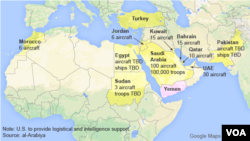Saudi-led coalition airstrikes against Houthi Shi’ite rebels in Yemen began last week, but already, security experts are warning that the conflict in Yemen might cause a new security challenge to East Africa.
Saudi Arabia is leading an Arab coalition with aerial bombardments to stop the advance of Shi'ite Houthi rebels on the port city of Aden and assure the internationally recognized government led by President Abd-Rabbu Mansour Hadi returns to power.
Currently 10 primarily Sunni-Arab states - including several Gulf states, Sudan, Egypt and Morocco - are taking part in the Saudi-led coalition in Yemen.
The move has prompted a growing list of nations to evacuate their citizens and is expected to spark an exodus of refugees - with many of them likely to land in the Horn of Africa nations of Eritrea, Djibouti and Somalia’s autonomous regions.
Security analyst Andrew Franklin said the power vacuum in Yemen also posed a huge risk that terrorist groups would expand operations.
"The fact that this is the same way so many illegal immigrants flow across into Yemen from Somalia, Somaliland, and Eritrea. There is a tremendous amount of trade between Yemen anyway, a lot of ports, smaller fishing ports, smaller trans-shipping points that were always fully policed. They were in fact policed by the central government in Sana'a; that government is gone. In this environment, much like in Libya, the strong or focus groups such as al-Qaida are able to expand their influence," he said.
Analyst Yan St. Pierre runs the Berlin-based security firm MOSECON. He agreed that well-established trade routes across the Red Sea and the Gulf of Aden would become highways for illegal activities and strengthen terrorism in the region.
"The flow of trade from West Africa to East Africa, from North Africa to East Africa and into the Arabian Peninsula has increased because there is a lot of money to be made as well. So definitely there will be an increase in weapons access. And there is no doubt this will affect the dynamic of the conflict in Yemen and in turn the spillover or the effect will affect the relationship of groups like al-Shabab for example and their effectiveness in Somalia, Kenya and neighboring states,” he said.
The Somali militant group has lost ground in the last couple years in the face of a concerted military effort by African Union troops and Somali forces. But al-Shabab has continued carrying out suicide and hit-and-run attacks both in and out of Somalia.
On Friday the group took over a hotel in Mogadishu - frequented by politicians and diplomats - for more than 10 hours, killing more than 10 people including the Somali ambassador to Switzerland.
Security experts told VOA that al-Shabab was likely now to step-up attacks against the Somali government to increase its bargaining power with the two major rival terrorist groups, al-Qaida and Islamic State.
It is believed the next two months will be critical as al-Shabab - which has pledged allegiance to al-Qaida - watches their actions in Yemen to decide whether to keep that tie.
St. Pierre noted division within al-Shabab meant they may be looking to switch allegiance to Islamic State - also known as ISIS - to get more funding and weapons.
“The issue with ISIS is it provides a lot of money and credibility. We have seen with Boko Haram, former al-Qaida in the Maghreb groups, that have pledged to ISIS. There is an appeal, ISIS does have a sort of aura, a certain appeal that's very attractive to disgruntled fighters and this is where ISIS preys and there are a lot disgruntled fighters in al-Shabab," he said.
And Franklin said that meant Kenya needed to brace for an increase in insurgent activities along its already besieged border area with Somalia.
"An increasing number of conventional weapons and trained jihadist fighters will now be able to transit through Yemen and cross into Somaliland, into northern Somalia and make their way along the coast down into Lamu County. The whole purpose of al-Shabab in Kenya to date has been to essentially motivate insurgency in highly marginalized areas but basically to eliminate the government of Kenya from its border areas with Somalia," he said.
After a series of cross-border attacks by al-Shabab militants Kenyan officials are working on building a wall along parts of the border to enhance security.





